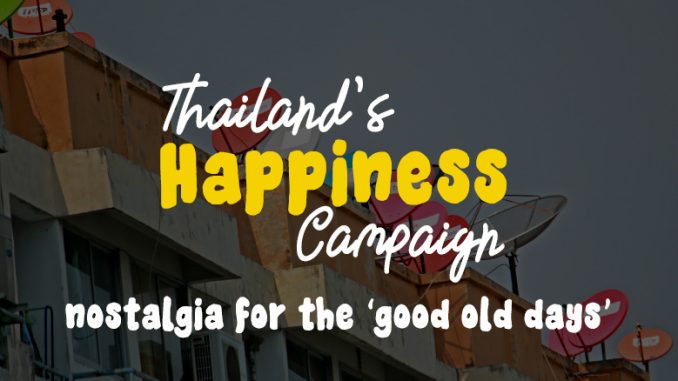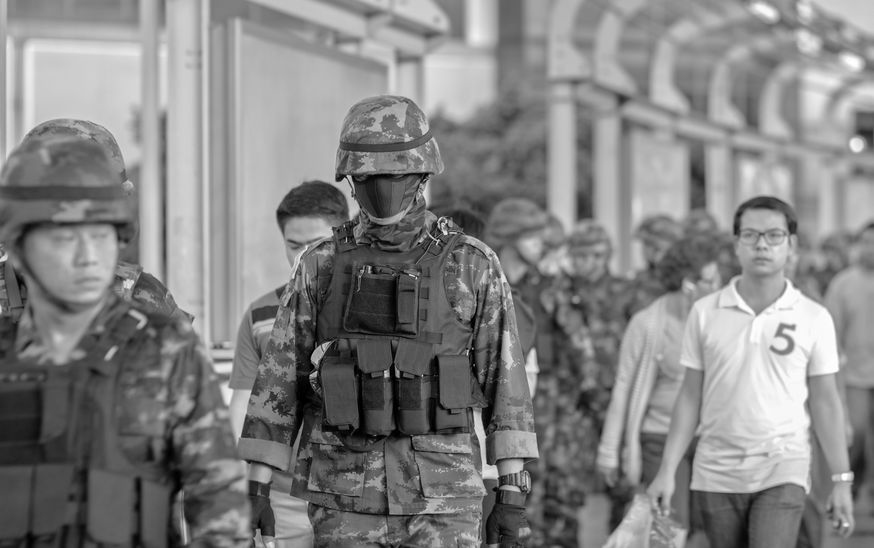
Since Simon Anholt (1998, 395), an independent policy advisor, first coined the term ‘nation branding’ in the late 1990s and proposed that nations, like products, can be branded and marketed through the use of commercial techniques, nation branding has become a widespread and popular practice in which many countries all over the world engage. Although most people typically associate nation branding with externally-oriented tourism and export promotion campaigns, nation branding spans a wide range of governmental activities that speak to both external and internal (that is domestic) audiences. As such, nation branding has important domestic implications and is revealing about domestic power politics and state-society relations.
There are surprisingly few studies that link nation branding to the process of political legitimation. Yet, as Cornelissen (2017, 526) points out, nation branding has become an indispensable part of state processes in many different countries. In Thailand, this has been the case since the premiership of Thaksin Shinawatra (2001-2006), a Sino-Thai communications tycoon-cum-politician, who introduced the use of commercial management, marketing and branding techniques into Thai politics. Under Thaksin, Thailand formulated its first nation branding strategy that spanned multiple sectors and involved both public and private actors (Pasuk and Baker 2004, 113-4). Since then, all successive governments – civilian or military – have continued to engage in nation branding activities. The National Council for Peace and Order (NCPO) that overthrew an elected government of Yingluck Shinawatra on 22 May 2014 was no exception. This essay analyses the NCPO’s first post-coup nation branding campaign – the ‘Happiness’ campaign – and argues that the NCPO used this campaign to help legitimate the 2014 coup.

Legitimating the 2014 Coup with the ‘Happiness’ Campaign
The NCPO launched their ‘Happiness’ campaign within a few days of the May 2014 coup. The campaign was aimed at softening domestic and international opposition towards the coup and strengthening the well-known association of Thailand as ‘the Land of Smiles.’ It comprised General Prayuth Chan-o-cha’s weekly address to the nation called ‘Returning Happiness to the People,’ a happiness ballad that Prayuth penned in the days following the coup, and a number of military-organised happiness festivals across Bangkok (See ‘Thai junta,’ 2014). The generals’ choice of happiness as the campaign’s main theme was not coincidental. Free from political ideology, happiness had the potential to appeal to all sections of Thailand’s deeply-divided society as well as to foreigners who had been discouraged from engaging with the country following the coup. For example, the military-organised happiness festivals offered free music, food, medical check-ups, haircuts and the spectacle of scantily-clad female dancers in camouflage mini-skirts to those who took part (See ‘Thai junta,’ 2014). The festivals were symbolic both in their meaning and location: Bangkok’s streets were once again clogged but this time with revellers, not protesters. Through the festivals, the junta wanted to show the world and Thai people that life under their rule – and the traditional establishment it represented – had many benefits. Above all, it was happy, peaceful and orderly. The campaign was saturated with a strong sense of nostalgia for the ‘good old days’ of the 1960s and 1980s when the country was governed by paternalistic military rulers and Thai populace was apolitical at large. This was the model of political rule, the NCPO wanted to restore.
For the NCPO, happiness simply meant the absence of political conflict rather than its resolution. The campaign branded the NCPO as reluctant saviours who were left with no other choice but to interfere in the country’s political affairs. It followed the established military tradition of justifying coups under the pretext of saving Thailand from ‘bad people’ that over the years included communists, corrupt politicians, and most recently Thaksin, his political networks and supporters (Baker 2016, 395-6). Although General Prayuth did not directly attack Thaksin and his political networks in his inaugural ‘Returning Happiness to the People’ broadcast, he linked happiness to the NCPO rule and contrasted it with nine years of frequent political conflicts under the Thaksin and pro-Thaksin governments. Prayuth’s happiness ballad – a four-minute mellow-sounding song performed by the Royal Thai Army band – also sought to reinforce the NCPO’s saviour narrative. The lyrics that Prayuth wrote himself promised that the military would take care of the Thai nation, the king and the people, and that it would restore the country so that it was ‘good’ again (See ‘Returning Happiness,’ 2014). Thai people just needed to leave things to the generals to sort out and to give them a ‘little more time’ (See ‘Returning Happiness,’ 2014). The ballad never specified how much more time the generals needed or what the promised ‘good’ country would look like, but the saviour narrative was firmly established. It presented the NCPO as acting in the interest and on behalf of the Thai people.
The song Return Happiness to Thailand with lines such as “we offer to guard and protect you with our hearts” and “we are asking for a little more time,” with accompaniment from the Royal Thai Army band.
The ‘Happiness’ campaign was accompanied by a fierce suppression of political dissent that, together with the coup, created superficial notions of peace and order by temporarily suspending the country’s political conflict. The country was under strict martial law since the coup under which gatherings of five or more people were banned – with the exception of the NCPO’s happiness festivals – and even the smallest signs of dissent were uncompromisingly suppressed (‘Sandwich eating,’ 2014). The generals used this semblance of normalcy as a key ingredient to their ‘Happiness’ campaign and positioned it as an antithesis to the ‘messy’ years under the Shinawatras and participatory democracy. The NCPO sought to establish happiness as a source of their political legitimacy by convincing their domestic audiences that Thailand under the military rule was an inherently better place than under participatory democracy.
Although it is difficult to evaluate the impact of the junta’s campaign, the UN World Happiness Reports suggest that Thailand’s happiness index increased annually between 2012 and 2016 (See Helliwell et al. 2017 and 2013). The reports measure happiness against six key variables: GDP, healthy life expectancy, social support, perceptions of corruption, prevalence of generosity and freedom of life choices. Despite the coup, Thailand ranked as the 32 happiest country in the world between 2014 and 2016 outperforming almost all of its Southeast Asian neighbours except Singapore. This was an increase of four places compared to Thailand’s pre-coup rank of 36 in 2013. It seems that the ‘Happiness’ campaign – propped up by the NCPO’s ‘peace and order’ rhetoric – resonated with Thai citizens at large.
Conclusion
The NCPO’s ‘Happiness’ campaign has important implications for our understanding of nation branding and the ways in which governments use this practice. As this essay briefly demonstrated, the ‘Happiness’ campaign was much more than an externally-oriented communication strategy aimed at positive self-stereotyping to attract foreign tourists or investors. Instead, the campaign was an exercise in political legitimation that sought to justify the 2014 coup and the NCPO rule. As such, it targeted both internal (that is domestic) and external audiences. The ‘Happiness’ campaign was not the only nation branding campaign launched by the NCPO following the May 2014 coup. Many more campaigns have been launched since – some have been more conventional, such as the 2015 ‘Discover Thainess’ tourism campaign or the 2016 ‘Thailand 4.0’ economic campaign, but their political function should not be underestimated. After all, nation branding does not take place in political vacuum. The decision to brand is first and foremost political: it is the government that decides whether to brand or not and for what purposes.
Petra Desatova
PhD candidate, School of Politics and International Studies, University of Leeds, UK.
Note: This essay is derived from the author’s doctoral research that examines the phenomenon of nation branding in the context of post-coup Thailand (2014-2016).
Kyoto Review of Southeast Asia, Trendsetters, January 2019
References
Anholt, Simon. ‘Nation-brands of the twenty-first century,’ Journal of Brand Management 5, no.6 (1998): 395-406.
Baker, Chris. ‘The 2014 Thai Coup and Some Roots of Authoritarianism,’ Journal of Contemporary Asia 46, no.3 (2016): 388-404.
Cornelissen, Scarlett. ‘National Meaning-Making in Complex Societies: Political Legitimation and Branding Dynamics in Post-Apartheid South Africa,’ Geopolitics 22, no.3 (2017): 526-48.
Helliwell, John, Richard Layard and Jeffrey Sachs, eds., World Happiness Report 2017 (New York: Sustainable Development Solutions Network, 2017), http://worldhappiness.report/wp-content/uploads/sites/2/2017/03/HR17_3-20-17.pdf.
Helliwell, John, Richard Layard and Jeffrey Sachs, eds., World Happiness Report 2013 (New York: Sustainable Development Solutions Network, 2013), http://worldhappiness.report/wp-content/uploads/sites/2/2013/09/WorldHappinessReport2013_online.pdf.
Hewison, Kevin and Kengkij Kitirianglarp, ‘“Thai-style Democracy:” The Royalist Struggle for Thailand’s Politics,’ in Saying the Unsayable: Monarchy and Democracy in Thailand, edited by Søren Ivarsson and Lotte Isager, 179-202. Copenhagen: NIAS Press, 2010.
Pasuk Phongpaichit and Chris Baker. Thaksin: The Business of Politics in Thailand. Chiang Mai: Silkworm Books, 2004.
‘Returning Happiness to Thailand,’ Youtube video, 10 September 2014, https://www.youtube.com/watch?v=hpFYaHTvFFo.
‘Sandwich eating and 1984: 8 things that can get you arrested in Thailand,’ The Telegraph, 11 September 2014, http://www.telegraph.co.uk/travel/destinations/asia/thailand/articles/Sandwich-eating-and-1984-8-things-that-can-get-you-arrested-in-Thailand/.
‘Thai junta “brings happiness to the people” with parties and selfies’, The Guardian, 4 June 2014, https://www.theguardian.com/world/2014/jun/04/thailand-to-bring-happiness-to-the-people.

An interesting analysis that gives an insight into the political situation in Thailand. That said; there are a few points that I see differently. Firstly, there seems to be a shift of metaphors. During the Thaksin administration the most prominent metaphor seemed to be THE NATION AS A COMMERCIAL PRODUCT; this can be seen in such slogans as Amazing Thailand, Thailand’s refinement, Kitchen of the world, ect; when a nation is seen as a commercial product, it can be branded or given certain positive attributions. On the contrary, after the coup the metaphor changed and switched back to the old ones; that is NATION AS A PERSON OR FAMILY. As a person, a nation can have mental and physical states such as sadness or happiness, joyfulness or depression etc. A happy person or family is the one without any conflicts which in turn reflects the fact that (at least in a hierarchical culture) children must listen to parents who set up rules and know what is right or wrong. Once the family metaphor is established, those with authority are legitimate in the public unconsciousness, and so they can get to decide what is right or wrong. And for those who try to challenged their moral authority, they would immediately face strong punishment; just like a strict father punishes a misbehaved child. Secondly, beside the person or family metaphor, a traditional narrative is used by the junta to legitimate its moral authority; that is say, after the coup the military attempted to make Thaksin as a bad guy and itself as a hero who is saving the victims from the bad person. This type of understanding has been used throughout Thai history such as Burma was seen as villain while King Naresuan as a hero who free the nation from the enemy. As far as ‘discover Thainess is concerned, a group of people also have traditions and cultures. And the military wants the public to see Thailand as individual group of people with unique traditions which are totally different from others, thereby setting them free from criticism, even though they appear to be oppressive and dehumanizing to people from other cultures such as prostration, monarchy as demi-god, lese majeste law, etc. In relation to the UN happiness report, I think true happiness does not occur overnight; it takes years of mental, physical, social, and economical experiences before one can say he/she is happy. Of course, the coup might bring delight to a group of people who prefer the traditional ways of how things should be done such as old elite and royalists and their networks, which create an unequal society. But for the majority poor, happiness won’t be there until they see a free and equal society coming.